Governor of Massachusetts
| Governor of the Commonwealth of Massachusetts | |
|---|---|
 Seal of the Governor | |
 Standard of the Governor | |
| Government of Massachusetts | |
| Style |
|
| Status | Head of state Head of government |
| Member of | Governor's Council Cabinet |
| Residence | None official |
| Seat | State House, Boston, Massachusetts |
| Nominator | Political parties |
| Appointer | Popular vote |
| Term length | Four years, no term limits[1] |
| Constituting instrument | Constitution of Massachusetts |
| Formation | Original post: April 30, 1629 Current form: October 25, 1780 |
| First holder | John Endecott |
| Deputy | Lieutenant Governor of Massachusetts |
| Salary | $185,000 (2018)[2] |
| Website | Official website |
The governor of the Commonwealth of Massachusetts is the chief executive officer of the government of Massachusetts. The governor is the head of the state cabinet and the commander-in-chief of the commonwealth's military forces.
Massachusetts has a republican system of government that is akin to a presidential system. The governor acts as the head of government while having a distinct role from that of the legislative branch. The governor has far-reaching political obligations, including ceremonial and political duties. The governor also signs bills into law and has veto power. The governor is a member of the Massachusetts Governor's Council, a popularly elected council with eight members who provide advice and consent on certain legal matters and appointments.[3]
Beginning with the Massachusetts Bay Company in 1629, the role of the governor has changed throughout its history in terms of powers and selection. The modern form of the position was created in the 1780 Constitution of Massachusetts, which called for the position of a "supreme executive magistrate".[4]
Governors of Massachusetts are elected every four years during state elections that are held on the first Tuesday of November after November 1. As of November 2022, the most recent Massachusetts gubernatorial election was held in 2022. Following each gubernatorial election, the elected governor is inaugurated on the Thursday after the first Wednesday following the next January 1.[5] There are no term limits restricting how long a governor may serve.[6][7][8] The longest-serving Massachusetts Governor is Michael Dukakis, who served 12 years; Dukakis was in office from 1975 to 1979 and from 1983 to 1991. As of November 2022, the governor of Massachusetts is Charlie Baker, a Republican. Maura Healey, a Democrat, is the governor-elect, having won the 2022 Massachusetts gubernatorial election.
Qualifications
Any person seeking to become Governor of Massachusetts must meet the following requirements:[9]
- Be at least eighteen years of age
- Be a registered voter in Massachusetts
- Be a Massachusetts resident for at least seven years when elected
- Receive 10,000 signatures from registered voters on nomination papers
History
The role of Governor has existed in Massachusetts since the Royal Charter of 1628. The original role of the governor was one of a president of the board of a joint-stock company, namely the Massachusetts Bay Company. The governor would be elected by freemen, who were shareholders of the company. These shareholders were mostly colonists themselves who fit certain religious requirements. The governor acted in a vice-regal manner, overseeing the governance and functioning of the colony. Originally they were supposed to reside in London, as was the case with other colonial company governors, although this protocol was broken when John Winthrop was appointed Governor. The governor served as the executive of the colony, originally elected annually, they were joined by a Council of Assistants. This council was a group of magistrates who performed judicial functions, acted as an upper house of the General Court, and provided advice and consent to the governor. The early governors of Massachusetts Bay were staunchly Puritan colonists who wished to form a state that coincided with religious law.[10]
With the founding of the Dominion of New England, the New England colonies were combined with the Province of New York, Province of West Jersey, and the Province of East Jersey. During this period (1686-1689) Massachusetts had no governor of its own. Instead there existed a royally appointed governor who resided in Boston and served at the King's pleasure. Though there existed a council which served as a quasi-legislature, however the logistics of calling the council to meet were so arduous that the Dominion was essentially governed by the Crown through the Royal Governor. The reason for the creation of such a post was there existed tremendous hostility between the Kingdom of England and the colonists of Massachusetts Bay. In an effort to bring the colonies under tighter control the Crown dismantled the old assembly system and created the Viceroy system based on the Spanish model in New Spain. This model of government was greatly disliked by the colonists all throughout British North America but especially in New England where colonists at one time did have some semblance of democratic and local control. With the Glorious Revolution and the Boston Revolt the Dominion was abolished in 1689.[11]
With the creation of the Massachusetts Charter in 1691, the role of civilian governor was restored in Massachusetts Bay. Now the Province of Massachusetts Bay, the colony then encompassed the territory of the Massachusetts Bay Colony, the Plymouth Colony, and areas of what is now the state of Maine. The governor however would not be chosen by the electorate, instead the position would remain a royal appointment. In order to ease tensions with royal authorities and the colonists the General Court was reestablished and given significant powers. This created acrimony between the governors and the assembly of the General Court. The governor could veto any decision made by the assembly and had control over the militia, however the General Court had authority of the treasury and provincial finances. This meant that in the event the governor did not agree with or consent with the rulings and laws of the General Court then the assembly would threaten to withhold any pay for the governor and other Royal Officers.[12]
From 1765 on the unraveling of the Province into a full political crisis only increased the tensions between the governor and the people of Massachusetts Bay. Following the passage of the Stamp Act Governor Thomas Hutchinson had his home broken into and ransacked. The early stages of the American Revolution saw political turmoil in Massachusetts Bay. With the passage of the Intolerable Acts the then Royal Governor Thomas Gage dissolved the General Court and began to govern the province by decree. In 1774 the Massachusetts Provincial Congress was formed as an alternative revolutionary government to the royal government in Boston. With Massachusetts Bay declaring its independence in May 1776 the role of Governor was vacant for four years. The executive role during this time was filled by the Governor's Council, the Committee of Safety, and the president of the Congress when in session.[12]
With the adoption of the Constitution of Massachusetts in 1780 the role of an elected civilian governor was restored. John Hancock was elected as the first governor of the independent commonwealth on October 25, 1780.[12]
Constitutional role
Part the Second, Chapter II, Section I, Article I of the Massachusetts Constitution reads,
There shall be a supreme executive magistrate, who shall be styled, The Governor of the Commonwealth of Massachusetts; and whose title shall be – His Excellency.
The governor of Massachusetts is the chief executive of the commonwealth, and is supported by a number of subordinate officers. He, like most other state officers, senators, and representatives, was originally elected annually. In 1918 this was changed to a two-year term, and since 1966 the office of governor has carried a four-year term. The governor of Massachusetts does not receive a mansion or other official residence and resides in their own private residence. The governor does receives a housing allowance/stipend for $65,000. The title "His Excellency" is a holdover from the royally appointed governors of the Province of Massachusetts Bay. The first governor to use the title was Richard Coote, 1st Earl of Bellomont, in 1699; since he was an Earl, it was thought proper to call him "Your Excellency." The title was retained until 1742, when an order from King George II forbade its further use. However, the framers of the state constitution revived it because they found it fitting to dignify the governor with this title.[13]
The governor also serves as commander-in-chief of the commonwealth's armed forces.
Succession
According to the Massachusetts State Constitution:
Whenever the chair of the governor shall be vacant, by reason of his death, or absence from the commonwealth, or otherwise, the lieutenant governor, for the time being, shall, during such vacancy, perform all the duties incumbent upon the governor, and shall have and exercise all the powers and authorities, which by this constitution the governor is vested with, when personally present.[14]
The Constitution does not use the term "acting governor," but the practice in Massachusetts has been that the lieutenant governor retains his or her position and title as "lieutenant governor" and becomes acting governor, not governor. The lieutenant governor, when acting as governor, is referred to as "the lieutenant-governor, acting governor" in official documents.[15]
Despite this terminology, the Massachusetts courts have found that the full authority of the office of the governor devolves to the lieutenant governor upon vacancy in the office of governor, and that there is no circumstance short of death, resignation, or impeachment that would relieve the acting governor from the full gubernatorial responsibilities.[citation needed]
The first use of the succession provision occurred in 1785, five years after the constitution's adoption, when Governor John Hancock resigned the post, leaving Lieutenant Governor Thomas Cushing as acting governor. Most recently, Jane Swift became acting governor upon the resignation of Paul Cellucci.
When the constitution was first adopted, the Governor's Council was charged with acting as governor in the event that both the governorship and lieutenant governorship were vacant. This occurred in 1799 when Governor Increase Sumner died in office on June 7, 1799, leaving Lieutenant Governor Moses Gill as acting governor. Acting Governor Gill never received a lieutenant and died on May 20, 1800, between that year's election and the inauguration of Governor-elect Caleb Strong. The Governor's Council served as the executive for ten days; the council's chair, Thomas Dawes was at no point named governor or acting governor.
Article LV of the Constitution, enacted in 1918, created a new line of succession:
- Governor (Charlie Baker)
- Lieutenant governor (Karyn Polito)
- Secretary of the Commonwealth (William F. Galvin)
- Attorney general (Maura Healey)
- Treasurer and receiver-general (Deb Goldberg)
- State auditor (Suzanne M. Bump)
Cabinet
The governor has a 10-person cabinet, each of whom oversees a portion of the government under direct administration (as opposed to independent executive agencies). See Government of Massachusetts for a complete listing.
Traditions
The front doors of the State House are only opened when a governor leaves office, a head of state or the president of the United States comes to visit the State House, or for the return of flags from Massachusetts regiments at the end of wars. The tradition of the ceremonial door originated when departing governor Benjamin Butler kicked open the front door and walked out by himself in 1884.[source?]
Incoming governors usually choose at least one past governor's portrait to hang in their office.
Immediately before being sworn into office, the governor-elect receives four symbols from the departing governor: the ceremonial pewter "Key" for the governor's office door, the Butler Bible, the "Gavel", and a two-volume set of the Massachusetts General Statutes with a personal note from the departing governor to their successor added to the back of the text. The governor-elect is then escorted by the sergeant-at-arms to the House Chamber and sworn in by the President of the Senate before a joint session of the House and Senate.[16]
Lone walk
Upon completion of their term, the departing governor takes a "lone walk" down the Grand Staircase, through the House of Flags, into Doric Hall, out the central doors, and down the steps of the Massachusetts State House. The governor then crosses the street into Boston Common, thereby symbolically rejoining the commonwealth as a private citizen. Benjamin Butler started the tradition in 1884.[17] Some walks have been modified with some past governors having their wives, friends, or staff accompany them.[18] A 19-gun salute is offered during the walk, and frequently the steps are lined by the outgoing governor's friends and supporters.[19]
In January 1991, outgoing lieutenant governor Evelyn Murphy, the first woman elected to statewide office in Massachusetts, walked down the stairs before Governor Michael Dukakis. In a break from tradition, the January 2007 inauguration of Governor Deval Patrick took place the day after outgoing governor Mitt Romney took the lone walk down the front steps.[19]
Governor's residence
Despite several proposals for establishing an official residence for the governor of Massachusetts, the Commonwealth of Massachusetts does not have a governor's mansion.
In 1955, Governor Foster Furcolo turned down a proposal to establish the Shirley–Eustis House in Roxbury, built by royal Governor William Shirley, as the official residence.[20]
At one time, Governor John A. Volpe accepted the donation of the Endicott Estate in Dedham from the heirs of Henry Bradford Endicott. He intended to renovate the 19th-century mansion into a splendid governor's residence.[21] After Volpe resigned to become United States Secretary of Transportation in the Nixon administration, the plan was aborted by his successor in consideration of budgetary constraints and because the location was considered too far from the seat of power, the State House in Boston.
Prior to their respective demolitions in 1922 and 1863, the Province House and the Hancock Manor[21] were also proposed as official residences.
Since the governor has no official residence, the expression "corner office," rather than "governor's mansion," is commonly used in the press as a metonym for the office of governor. This refers instead to the governor's office on the third floor of the State House.[22]
List of governors
Since 1780, 65 people have been elected governor, six to non-consecutive terms (John Hancock, Caleb Strong, Marcus Morton, John Davis, John Volpe, and Michael Dukakis), and seven lieutenant governors have acted as governor without subsequently being elected governor. Thomas Talbot served a stint as acting governor, but later was elected governor several years later. Prior to 1918 constitutional reforms, both the governor's office and that of lieutenant governor were vacant on one occasion, when the state was governed by the Governor's Council.
Colonial Massachusetts
The colonial history of Massachusetts begins with the founding first of the Plymouth Colony in 1620, and then the Massachusetts Bay Colony in 1628. The Dominion of New England combined these and other New England colonies into a single unit in 1686, but collapsed in 1689. In 1692 the Province of Massachusetts Bay was established, merging Plymouth and Massachusetts Bay, which then included the territory of present-day Maine.
Colonial governors of Plymouth and the Massachusetts Bay Colony were elected annually by a limited subset of the male population (known as freemen), while Dominion officials and those of the 1692 province were appointed by the British crown. In 1774 General Thomas Gage became the last royally appointed governor of Massachusetts. He was recalled to England after the Battle of Bunker Hill in June 1775, by which time the Massachusetts Provincial Congress exercised de facto control of Massachusetts territory outside British-occupied Boston. Between 1775 and the establishment of the Massachusetts State Constitution in 1780 the state was governed by the provincial congress and an executive council.
Commonwealth of Massachusetts: 1780–present
In the table below, acting governors are denoted in the leftmost column by the letter "A", and are not counted as actual governors. The longest-serving governor was Michael Dukakis, who served twelve years in office, although they were not all consecutive. The longest period of uninterrupted service by any governor was nine years, by Levi Lincoln Jr. The shortest service period by an elected governor was one year, achieved by several 19th century governors. Increase Sumner, elected by a landslide to a third consecutive term in 1799, was on his deathbed and died not long after taking the oath of office; this represents the shortest part of an individual term served by a governor. Sumner was one of four governors to die in office; seven governors resigned, most of them to assume another office.
| Political party | Number of governors |
|---|---|
| Democratic | 21 |
| Democratic-Republican | 5 |
| Federalist | 5 |
| Know Nothing | 1 |
| National Republican | 2 |
| No party affiliation | 6 |
| Republican | 34 |
| Whig | 6 |
| # | Governor | Party | Years | Lieutenant Governor | Electoral history |
|---|---|---|---|---|---|
| 1 |  John Hancock |
None | October 25, 1780 – February 17, 1785 |
Thomas Cushing (1780–1788) |
Resigned due to claimed illness (recurring gout). |
| A[23] |  Thomas Cushing |
None | February 17, 1785 – May 27, 1785 |
Acted as governor for the remainder of Hancock's term. Lost election in his own right. | |
| 2 |  James Bowdoin |
None | May 27, 1785 – May 30, 1787 |
Lost re-election. | |
| 3 |  John Hancock |
None | May 30, 1787 – October 8, 1793 |
Died. | |
| Benjamin Lincoln (1788–1789) | |||||
| Samuel Adams (1789–1794) | |||||
| 4 | 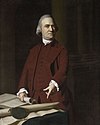 Samuel Adams |
None | October 8, 1793 – June 2, 1797 |
Acted as governor for the remainder of Hancock's term. Elected and re-elected in his own right until retirement. | |
| Moses Gill (1794–1800) | |||||
| 5 |  Increase Sumner |
Federalist | June 2, 1797 – June 7, 1799 |
Died. | |
| A[23] |  Moses Gill |
None | June 7, 1799 – May 20, 1800 |
Acted as governor for most of the remainder of Sumner's term. Died ten days before its end. | |
| A[23] |  Governor's Council |
None | May 20, 1800 – May 30, 1800 |
None. | The council was headed by Thomas Dawes. this is the only time both the governorship and the lieutenant governorship were vacant. |
| 6 |  Caleb Strong |
Federalist | May 30, 1800 – May 29, 1807 |
Samuel Phillips Jr. (1801–1802) |
Lost re-election. |
| Edward Robbins (1802–1806) | |||||
| 7 |  James Sullivan |
Democratic- Republican |
May 29, 1807 – December 10, 1808 |
Levi Lincoln Sr. | Died. |
| A[23] | 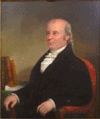 Levi Lincoln Sr. |
Democratic- Republican |
December 10, 1808 – May 1, 1809 |
Acted as governor for the remainder of Sullivan's term. Lost election in his own right. | |
| 8 | 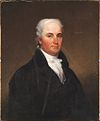 Christopher Gore |
Federalist | May 1, 1809 – June 10, 1810 |
David Cobb | Lost re-election. |
| 9 |  Elbridge Gerry |
Democratic- Republican |
June 10, 1810 – June 5, 1812 |
William Gray | Lost re-election. |
| 10 |  Caleb Strong |
Federalist | June 5, 1812 – May 30, 1816 |
William Phillips Jr. | Retired. |
| 11 |  John Brooks |
Federalist | May 30, 1816 – May 31, 1823 |
Retired. | |
| 12 | 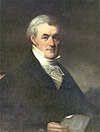 William Eustis |
Democratic- Republican |
May 31, 1823 – February 6, 1825 |
Levi Lincoln Jr. (1823–1824) |
Died. |
| Marcus Morton (1824–1825) | |||||
| A[23] |  Marcus Morton |
Democratic- Republican |
February 6, 1825 – May 26, 1825 |
Acted as governor for the remainder of Eustis's term. Retired. | |
| 13 |  Levi Lincoln Jr. |
National Republican |
May 26, 1825 – January 9, 1834 |
Thomas L. Winthrop (1826–1833) |
Retired. |
| 14 |  John Davis |
National Republican |
January 9, 1834 – March 1, 1835 |
Samuel Turell Armstrong | Resigned to become U.S. Senator. |
| A[23] |  Samuel Turell Armstrong |
Whig | March 1, 1835 – January 13, 1836 |
Acted as governor for the remainder of Davis's term. Lost nomination. lost election as independent. | |
| 15 | 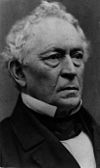 Edward Everett |
Whig | January 13, 1836 – January 18, 1840 |
George Hull | Lost re-election |
| 16 |  Marcus Morton |
Democratic | January 18, 1840 – January 7, 1841 |
Lost re-election. | |
| 17 |  John Davis |
Whig | January 7, 1841 – January 17, 1843 |
Lost re-election. | |
| 18 |  Marcus Morton |
Democratic | January 17, 1843 – January 9, 1844 |
Henry H. Childs | Lost re-election. |
| 19 |  George N. Briggs |
Whig | January 9, 1844 – January 11, 1851 |
John Reed Jr. | Lost re-election. |
| 20 |  George S. Boutwell |
Democratic | January 11, 1851 – January 14, 1853 |
Henry W. Cushman | Retired. |
| 21 |  John H. Clifford |
Whig | January 14, 1853 – January 12, 1854 |
Elisha Huntington | Retired. |
| 22 | 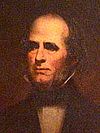 Emory Washburn |
Whig | January 12, 1854 – January 4, 1855 |
William C. Plunkett | Lost re-election. |
| 23 |  Henry Gardner |
Know-Nothing | January 4, 1855 – January 7, 1858 |
Simon Brown (1855–1856) |
Lost re-election. |
| Henry W. Benchley (1856–1858) | |||||
| 24 |  Nathaniel Prentice Banks |
Republican | January 7, 1858 – January 3, 1861 |
Eliphalet Trask | Retired to run for president. |
| 25 | 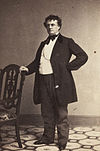 John Albion Andrew |
Republican | January 3, 1861 – January 4, 1866 |
John Z. Goodrich (1861) |
Retired. |
| John Nesmith (1862) | |||||
| Joel Hayden (1863–1866) | |||||
| 26 |  Alexander H. Bullock |
Republican | January 4, 1866 – January 7, 1869 |
William Claflin | Retired. |
| 27 |  William Claflin |
Republican | January 7, 1869 – January 4, 1872 |
Joseph Tucker (1869–1873) |
Retired. |
| 28 |  William B. Washburn |
Republican | January 4, 1872 – April 29, 1874 |
Resigned to become U.S. Senator. | |
| Thomas Talbot (1873–1875) | |||||
| A[23] |  Thomas Talbot |
Republican | April 29, 1874 – January 7, 1875 |
Acted as governor for the remainder of Washburn's term. Lost election in his own right. | |
| 29 | 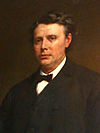 William Gaston |
Democratic | January 7, 1875 – January 6, 1876 |
Horatio G. Knight | Lost re-election. |
| 30 |  Alexander H. Rice |
Republican | January 6, 1876 – January 2, 1879 |
Retired. | |
| 31 |  Thomas Talbot |
Republican | January 2, 1879 – January 8, 1880 |
John Davis Long | Retired. |
| 32 |  John Davis Long |
Republican | January 8, 1880 – January 4, 1883 |
Byron Weston | Retired. |
| 33 |  Benjamin F. Butler |
Democratic | January 4, 1883 – January 3, 1884 |
Oliver Ames | Lost re-election. |
| 34 |  George D. Robinson |
Republican | January 3, 1884 – January 6, 1887 |
Retired. | |
| 35 |  Oliver Ames |
Republican | January 6, 1887 – January 7, 1890 |
John Q. A. Brackett | Retired. |
| 36 |  John Q. A. Brackett |
Republican | January 7, 1890 – January 8, 1891 |
William H. Haile (1890–1893) |
Lost re-election. |
| 37 |  William E. Russell |
Democratic | January 8, 1891 – January 4, 1894 |
Retired. | |
| Roger Wolcott (1893–1897) | |||||
| 38 |  Frederic T. Greenhalge |
Republican | January 4, 1894 – March 5, 1896 |
Died. | |
| 39 | 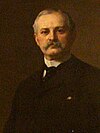 Roger Wolcott |
Republican | March 5, 1896 – January 4, 1900 |
Acted as governor for the remainder of Greenhalge's term. Elected and re-elected in own right until retirement. | |
| Winthrop Murray Crane (1897–1900) | |||||
| 40 |  Winthrop Murray Crane |
Republican | January 4, 1900 – January 8, 1903 |
John L. Bates | Retired. |
| 41 |  John L. Bates |
Republican | January 8, 1903 – January 5, 1905 |
Curtis Guild Jr. | Retired. |
| 42 |  William L. Douglas |
Democratic | January 5, 1905 – January 4, 1906 |
Retired. | |
| 43 |  Curtis Guild Jr. |
Republican | January 4, 1906 – January 7, 1909 |
Eben Sumner Draper | Retired. |
| 44 |  Eben Sumner Draper |
Republican | January 7, 1909 – January 5, 1911 |
Louis A. Frothingham | Lost re-election. |
| 45 | 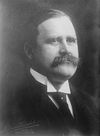 Eugene Noble Foss |
Democratic | January 5, 1911 – January 8, 1914 |
Louis A. Frothingham (1911–1912) |
Did not stand for renomination as Democrat. defeated as independent in general election. |
| Robert Luce (1912–1913) | |||||
| David I. Walsh (1913–1914) | |||||
| 46 |  David I. Walsh |
Democratic | January 8, 1914 – January 6, 1916 |
Edward P. Barry (1914–1915) |
Lost re-election. |
| Grafton D. Cushing (1915–1916) | |||||
| 47 |  Samuel W. McCall |
Republican | January 6, 1916 – January 2, 1919 |
Calvin Coolidge | Retired. |
| 48 |  Calvin Coolidge |
Republican | January 2, 1919 – January 6, 1921 |
Channing H. Cox | Retired
Vice President of the United States 1921-1923 President of the United States 1923-1929 |
| 49 |  Channing H. Cox |
Republican | January 6, 1921 – January 8, 1925 |
Alvan T. Fuller | Elected in 1920 (first two-year term). Re-elected in 1922. Retired. |
| 50 | 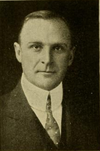 Alvan T. Fuller |
Republican | January 8, 1925 – January 3, 1929 |
Frank G. Allen | Retired. |
| 51 | 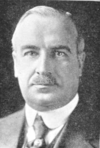 Frank G. Allen |
Republican | January 3, 1929 – January 8, 1931 |
William S. Youngman | Lost re-election. |
| 52 |  Joseph B. Ely |
Democratic | January 8, 1931 – January 3, 1935 |
William S. Youngman (1929–1933) |
Retired. |
| Gaspar G. Bacon (1933–1935) | |||||
| 53 |  James Michael Curley |
Democratic | January 3, 1935 – January 7, 1937 |
Joseph L. Hurley | Retired to run unsuccessfully for U.S. Senate |
| 54 |  Charles F. Hurley |
Democratic | January 7, 1937 – January 5, 1939 |
Francis E. Kelly | Lost renomination. |
| 55 |  Leverett Saltonstall |
Republican | January 5, 1939 – January 4, 1945 |
Horace T. Cahill | Retired to run successfully for U.S. Senate |
| 56 |  Maurice J. Tobin |
Democratic | January 4, 1945 – January 2, 1947 |
Robert F. Bradford | Lost re-election. |
| 57 |  Robert F. Bradford |
Republican | January 2, 1947 – January 6, 1949 |
Arthur W. Coolidge | Elected in 1946. Lost re-election. |
| 58 |  Paul A. Dever |
Democratic | January 6, 1949 – January 8, 1953 |
Charles F. Sullivan | Elected in 1948. Re-elected in 1950. Lost re-election. |
| 59 |  Christian A. Herter |
Republican | January 8, 1953 – January 3, 1957 |
Sumner G. Whittier | Elected in 1952. Re-elected in 1954. Retired. |
| 60 |  Foster Furcolo |
Democratic | January 3, 1957 – January 5, 1961 |
Robert F. Murphy (1957–1960) |
Elected in 1956. Re-elected in 1958. Retired to run for U.S. Senator. |
| 61 | 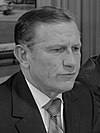 John Volpe |
Republican | January 5, 1961 – January 3, 1963 |
Edward F. McLaughlin Jr. | Elected in 1960. Lost re-election. |
| 62 |  Endicott Peabody |
Democratic | January 3, 1963 – January 7, 1965 |
Francis Bellotti | Elected in 1962. Lost renomination. |
| 63 |  John Volpe |
Republican | January 7, 1965 – January 22, 1969 |
Elliot Richardson (1965–1967) |
Elected in 1964. Re-elected in 1966 (first four-year term). Resigned to become U.S. Secretary of Transportation. |
| Francis Sargent (1967–1969) | |||||
| 64 |  Francis Sargent |
Republican | January 22, 1969 – January 2, 1975 |
Acted as governor for the remainder of Volpe's term. Elected in own right in 1970. Lost re-election. | |
| Donald Dwight (1971–1975) | |||||
| 65 |  Michael Dukakis |
Democratic | January 2, 1975 – January 4, 1979 |
Thomas P. O'Neill III | Elected in 1974. Lost renomination. |
| 66 |  Edward J. King |
Democratic | January 4, 1979 – January 6, 1983 |
Elected in 1978. Lost renomination. | |
| 67 |  Michael Dukakis |
Democratic | January 6, 1983 – January 3, 1991 |
John Kerry (1983–1985) |
Elected in 1982. Re-elected in 1986. Retired. |
| Vacant (1985–1987) | |||||
| Evelyn Murphy (1987–1991) | |||||
| 68 |  Bill Weld |
Republican | January 3, 1991 – July 29, 1997 |
Paul Cellucci (1991–1999) |
Elected in 1990. Re-elected in 1994. Resigned when nominated U.S. Ambassador to Mexico, but was not confirmed to the office. |
| A[23] 69 |
 Paul Cellucci |
Republican | July 29, 1997 – April 10, 2001 |
Acted as governor for the remainder of Weld's term. Elected in own right in 1998. Resigned to become U.S. Ambassador to Canada. | |
| Jane Swift (1999–2003) | |||||
| A[23] |  Jane Swift |
Republican | April 10, 2001 – January 2, 2003 |
Acted as governor for the remainder of Cellucci's term. Retired. | |
| 70 |  Mitt Romney |
Republican | January 2, 2003 – January 4, 2007 |
Kerry Healey | Elected in 2002. Retired to unsuccessfully run for president. |
| 71 |  Deval Patrick |
Democratic | January 4, 2007 – January 8, 2015 |
Tim Murray (2007–2013) |
Elected in 2006. Re-elected in 2010. Retired. |
| Vacant | |||||
| 72 |  Charlie Baker |
Republican | January 8, 2015 – Incumbent[a] |
Karyn Polito | Elected in 2014. Re-elected in 2018. Retiring at end of term. |
| 73 |  Maura Healey |
Democratic | January 5, 2023 – Elected |
Kim Driscoll (elect) | Elected in 2022. |
Other high offices held
This is a table of notable government offices held by governors. All representatives and senators mentioned represented Massachusetts, except otherwise noted.
Educational backgrounds
No governor of Massachusetts has graduated from the state's public university system, making the University of Massachusetts one of only two American public university systems to never produce a governor of its respective state.[citation needed]
A plurality of governors, and a majority of those who attended any college, graduated from Harvard College. Marcus Morton (Brown) was the first Governor to graduate from an institution other than Harvard College.
Undergraduate institutions
| Institution | # | Governors |
|---|---|---|
| Harvard College | 24* | John Hancock,[24] James Bowdoin,[25] Samuel Adams,[26] Increase Sumner,[27] Caleb Strong,[28] Christopher Gore,[29] Elbridge Gerry,[30] William Eustis,[31] Levi Lincoln Jr.,[32] Edward Everett,[33] John Davis Long,[34] George D. Robinson,[35] John Q. A. Brackett,[36] William Russell, Frederic Greenhalge*,[37] Roger Wolcott, Curtis Guild Jr.,[38] Leverett Saltonstall,[39] Robert F. Bradford,[40] Christian Herter,[41] Endicott Peabody,[42] Bill Weld,[43] Deval Patrick, Charlie Baker |
| Brown College | 5* | Marcus Morton,[44] John H. Clifford,[45] William Claflin*,[46] William Gaston,[47] Oliver Ames,[48] |
| Boston College | 4* | Charles F. Hurley*,[49] Maurice J. Tobin, Edward J. King,[50] Paul Cellucci[51] |
| Dartmouth College | 3* | Emory Washburn*,[52] Samuel W. McCall,[53] Channing Cox[54] |
| Yale College | 3 | John Davis,[55] William Washburn,[56] Foster Furcolo[57] |
| Amherst College | 2 | Alexander Bullock,[58] Calvin Coolidge |
| Boston University | 2 | John L. Bates, Paul A. Dever[59] |
| Bowdoin College | 2 | Henry Gardner,[60] John Albion Andrew[61] |
| MIT | 2 | Eben Draper,[62] Francis Sargent[63] |
| Williams College | 2 | Emory Washburn,[52] Joseph B. Ely[64] |
| Brigham Young University | 1 | Mitt Romney |
| Colby College | 1 | Benjamin Butler[65] |
| Holy Cross | 1 | David I. Walsh[66] |
| Swarthmore College | 1 | Michael Dukakis[67] |
| Union College | 1 | Alexander Rice[68] |
| University College, Oxford | 1 | Bill Weld[43] |
| Wentworth Institute | 1 | John Volpe[69] |
| University of Vermont | 1* | Eugene Foss* |
| Northeastern University | 1* | Paul A. Dever*[59] |
| None | 11 | James Sullivan, John Brooks, George N. Briggs, George S. Boutwell,[70] Nathaniel P. Banks, Thomas Talbot, W. Murray Crane, William L. Douglas, Alvan T. Fuller, Frank G. Allen, James Michael Curley |
An asterisk indicates that the Governor attended but did not graduate from that institution.
Acting Governors Thomas Cushing and Levi Lincoln Sr. also attended Harvard College. Acting Governor Jane Swift attended Trinity College. Acting Governors Moses Gill and Samuel Armstrong attended no recorded institution. Governor Frank Allen was admitted to Harvard but did not attend.
Graduate degrees: As with undergraduate institutions, the vast majority of governors who received graduate degrees did so from Harvard University. Of those, all but three degrees were law degrees from Harvard Law School; Elbridge Gerry and Edward Everett received masters' degrees and Mitt Romney, who also received a law degree, received a master's in business administration. Other than those, Charlie Baker is the only governor with a graduate degree not in law; he holds an M.B.A. from Northwestern University.
Romney and Everett are the only governors with multiple graduate degrees, and Everett is the only Ph.D. holder.
| Institution | # | Governors |
|---|---|---|
| Harvard University | 15 | Elbridge Gerry (A.M.), Edward Everett (M.A.), Alexander Bullock (LL.B.),[58] John Davis Long (LL.B.),[34] John Q.A. Brackett (LL.B.),[36] Roger Wolcott (LL.B.), Channing Cox (LL.B.)[54] Joseph B. Ely (LL.B.),[64] Leverett Saltonstall (LL.B.),[39] Robert F. Bradford (LL.B.),[40] Endicott Peabody (J.D.),[42] Michael Dukakis (J.D.),[67] Bill Weld (J.D.),[43] Mitt Romney (J.D., M.B.A.), Deval Patrick (J.D.) |
| Boston University | 4 | William Russell (LL.B.)[71], John L. Bates (LL.B.), David I. Walsh (LL.B.),[66] Paul A. Dever (LL.B.)[59] |
| Boston College | 1 | Paul Cellucci (J.D.)[51] |
| Northwestern University | 1 | Charlie Baker (M.B.A.) |
| University of Göttingen | 1 | Edward Everett (Ph.D.) |
| Yale University | 1 | Foster Furcolo (LL.B.)[57] |
Governor Christian Herter entered a graduate program in architecture at Columbia University but did not complete the degree.[41]
Living former governors
As of November 2018[update], there are five former governors or acting governors of Massachusetts who are still alive, the oldest being Michael Dukakis (served 1975–1979 and 1983–1991, born 1933). The most recent governor of Massachusetts to have died was Paul Cellucci (served 1997–1999 [acting] and 1999–2001, born 1948), on June 8, 2013.[72]
| Governor | Gubernatorial term | Date of birth (and age) |
|---|---|---|
| Michael Dukakis | 1975–1979 1983–1991 |
November 3, 1933 |
| William F. Weld | 1991–1997 | July 31, 1945 |
| Jane Swift | 2001–2003 (acting) | February 24, 1965 |
| Mitt Romney | 2003–2007 | March 12, 1947 |
| Deval Patrick | 2007–2015 | July 31, 1956 |
See also
References
- ^ "Which States Have Term Limits On Governor?". Term Limits.com. Washington, DC: U.S. Term Limits. Retrieved December 3, 2020.
Thirty-six states have some form of term limit on the office of governor. Fourteen states do not. They are: Connecticut, Idaho, Illinois, Iowa, Massachusetts, Minnesota, New Hampshire, New York, North Dakota, Texas, Utah, Vermont, Washington, and Wisconsin.
- ^ Michaels, Matthew (June 22, 2018). "Here's the salary of every governor in the United States". Business Insider.
- ^ Morison 1917, p.22-28.
- ^ "Massachusetts Constitution".
- ^ William, Galvin. "Elected Officials' Effective Dates of Office". Elected Officials’ Effective Dates of Office. Secretary of the Commonwealth of Massachusetts. Retrieved November 6, 2022.
- ^ "A Third Term For Governor Charlie Baker?". News. June 8, 2019. Retrieved August 3, 2020.
- ^ "What Charlie Baker faces should he seek a third term". Boston Herald. July 4, 2020. Retrieved August 3, 2020.
- ^ "Term Limits on Governor". U.S. Term Limits. Retrieved August 3, 2020.
- ^ https://www.sec.state.ma.us/ele/elepdf/Candidates-Guide-generic.pdf [bare URL PDF]
- ^ Adams 1913, p.444-445.
- ^ Adams 1913, p.430-445
- ^ a b c Morison 1917, p.9-22.
- ^ Frothingham, Louis Adams. A Brief History of the Constitution and Government of Massachusetts, p. 74. Cambridge: Harvard University Press, 1916.
- ^ Constitution of Massachusetts, Chapter II, Section II, Article III.
- ^ An example of this is found in Chapter 45 of the Acts of 2001, where a veto by Swift was overridden by the General Court.
- ^ Massachusetts State Library Information, Governor Transfer of Power, Retrieved February 14, 2007.
- ^ "A Tour of the Grounds of the Massachusetts State House". Secretary of the Commonwealth of Massachusetts. Retrieved June 8, 2012.
- ^ Braun, Stephen (December 3, 2011). "Mitt Romney not alone in destroying records". The Herald News.
- ^ a b "Romney takes 'lone walk' out of office". Bangor Daily News. January 4, 2007.
- ^ "Shirley Eustis House". Archived from the original on September 28, 2007.
- ^ a b "Commonwealth Magazine, Fall 1999".
- ^ "State House 3rd Floor information, floor plan, and room listing". The 191st General Court of the Commonwealth of Massachusetts.
- ^ a b c d e f g h i Acting governors are not counted.
- ^ Fowler, William M. Jr. (1980). The Baron of Beacon Hill: A Biography of John Hancock. Boston: Houghton Mifflin. p. 31. ISBN 0-395-27619-5.
- ^ Winthrop, Robert (1852). The Life and Service of James Bowdoin. Boston: Little, Brown. p. 94. OCLC 296634.
- ^ Alexander, John K. (2002). Samuel Adams: America's Revolutionary Politician. Lanham, Maryland: Rowman & Littlefield. p. 1. ISBN 0-7425-2115-X.
- ^ Bridgman, Thomas (1856). The Pilgrims of Boston and Their Descendants. New York: D. Appleton and Company. p. 82.
- ^ Trumbull, John (1902). History of Northampton, Volume 2. Northampton, MA: Gazette Printing Co. p. 594. OCLC 2772422.
- ^ Stark, James Henry (1910). The Loyalists of Massachusetts and the Other Side of the Revolution. Boston, MA: J.H. Stark. p. 393. OCLC 1655711.
- ^ Billias, George (1976). Elbridge Gerry, Founding Father and Republican Statesman. McGraw-Hill Publishers. p. 94. ISBN 0-07-005269-7.
- ^ Sobel, Robert, ed. (1990). Biographical Directory of the Executive Branch, 1774–1989. New York: Greenwood Press. p. 117. ISBN 9780313265938. OCLC 20722691.
- ^ Worcester Bank and Trust Co (1920). Forty Immortals of Worcester and its County. Boston: Walton Advertising and Printing Co. p. 25. OCLC 2961541.
- ^ Frothingham, Paul Revere (1925). Edward Everett, Orator and Statesman. Boston: Houghton Mifflin Company. pp. 12–14. OCLC 1517736.
- ^ a b Johnson, Rossiter; Brown, John Howard, eds. (1904). The Twentieth Century Biographical Dictionary of Notable Americans, Volume 7. Boston: Biographical Society. OCLC 6182270.
- ^ Gleason, Daniel (1906). Memorial of the Harvard College Class of 1856. Boston: George Ellis. p. 231. OCLC 45294512.
- ^ a b Reno, Conrad (1901). Memoirs of the Judiciary and the Bar, Volume 2. Boston: Century Memorial Publishing. p. 39. OCLC 426554681.
- ^ Beauchesne, James (1999). "Greenhalge, Frederic Thomas". Dictionary of American National Biography. Vol. 9. New York: Oxford University Press. pp. 537–538. ISBN 9780195206357. OCLC 39182280.
- ^ Hill, Edwin (1919). The Historical Register. New York: Edwin Hill. p. 30. OCLC 7782556.
- ^ a b Reichard, Gary (1999). "Saltonstall, Leverett". Dictionary of American National Biography. Vol. 19. New York: Oxford University Press. pp. 223–224. ISBN 9780195206357. OCLC 39182280.
- ^ a b Hannan, Caryn, ed. (2008). Massachusetts Biographical Dictionary. Hamburg, MI: State History Publications. p. 59. ISBN 9781878592668. OCLC 198759744.
- ^ a b "Christian A. Herter (1959–1961) | Miller Center". millercenter.org. October 4, 2016. Retrieved March 18, 2022.
- ^ a b Porter, David L, ed. (1995). Biographical Dictionary of American Sports. Westport, CT: Greenwood Publishing Group. p. 499. ISBN 9780313284311. OCLC 30812419.
- ^ a b c U.S.A. "Classics: William Weld". Willamette.edu. Retrieved March 18, 2022.
- ^ Earle, Jonathan (2000). "Marcus Morton and the Dilemma of Jacksonian Antislavery in Massachusetts, 1817–1849". Massachusetts Historical Review. 4: 63–64. JSTOR 25081171.
- ^ Reno, Conrad (1901). Memoirs of the Judiciary and the Bar, Volume 2. Boston: Century Memorial Publishing. p. 118. OCLC 426554681.
- ^ Ensign, Charles Sidney (April 1907). "Hon. William Claflin, LL. D." The New England Historical and Genealogical Register: 112.
- ^ City of Boston (1895). A Memorial of William Gaston. Boston. pp. 40–43. OCLC 733824.
{{cite book}}: CS1 maint: location missing publisher (link) - ^ Clarke, James W (1887). The Bay State Monthly: A Massachusetts Magazine of Literature, History, Biography and State Progress Vol. II. Boston: John N. McClintock and Company. p. 187. OCLC 9960776.
- ^ Hannon, Caryn (2008). Massachusetts Biographical Dictionary. Hamburg, MI: State History Publications. p. 249. ISBN 9781878592668. OCLC 198759744.
- ^ "Ed King Stats". Pro-Football-Reference.com. Sports Reference LLC. Retrieved March 18, 2022.
- ^ a b Duncan, Phil (December 1997). Politics In America, 1998: The 105th Congress. Congressional Quarterly. ISBN 9780871879172.
- ^ a b Spector, Robert (April 1978). "Emory Washburn: Conservator of the New England Legal Heritage". The American Journal of Legal History. 22 (2): 119. doi:10.2307/844621. JSTOR 844621.
- ^ Evans, Lawrence Boyd (1916). Samuel McCall, Governor of Massachusetts. Boston: Houghton, Mifflin. pp. 14–16. OCLC 1926950.
- ^ a b "Former Governor Channing Cox dies". Boston Globe. August 21, 1968.
- ^ Davis, William Thomas (1895). Bench and Bar of the Commonwealth of Massachusetts, Volume 2. Boston: Boston History Co. p. 146. OCLC 15711603.
- ^ Williams, H. Clay, ed. (1883). Biographical Encyclopedia of Massachusetts in the 19th Century, Volume 2. Boston: Metropolitan Publishing and Engraving Company. p. 35. OCLC 4952161.
- ^ a b United States Congress. "Governor of Massachusetts (id: F000431)". Biographical Directory of the United States Congress. Retrieved January 24, 2008.
- ^ a b Crane, Ellery Bicknell (1907). Historic Homes and Institutions and Genealogical and Personal Memoirs of Worcester County, Massachusetts: With a History of Worcester Society of Antiquity, Volume 1. New York: Lewis Publishing. p. 20. OCLC 35865737.
- ^ a b c Hannan, Caryn, ed. (2008). Massachusetts Biographical Dictionary. Hamburg, MI: State History Publications. ISBN 9781878592668. OCLC 198759744.
- ^ Wright, Frank (1888). Parker, Arthur; Kimball, Frank (eds.). History of the Bowdoin College Alumni Association of Boston and Vicinity, 1868–87. Salem, MA: Salem Press. p. 101. OCLC 79014812.
- ^ Reno, Conrad (1901). Memoirs of the Judiciary and the Bar, Volume 2. Boston: Century Memorial Publishing. p. 377. OCLC 426554681.
- ^ National Association of Wool Manufacturers (1914). "Eben S. Draper, Obituary". Bulletin. National Association of Wool Manufacturers. pp. 187–189. Retrieved March 18, 2022.
- ^ "Gov. Francis Sargent, MIT lecturer and alumnus, dies at 83". MIT News. October 28, 1998. Retrieved March 18, 2022.
- ^ a b Gentile, Richard H (1999). "Ely, Joseph B". Dictionary of American National Biography. Vol. 7. New York: Oxford University Press. pp. 474–475. ISBN 9780195206357. OCLC 39182280.
- ^ West, Richard Sedgewick (1965). Lincoln's Scapegoat General: A Life of Benjamin F. Butler, 1818–1893. Boston: Houghton Mifflin. pp. 13–16. OCLC 241783.
- ^ a b Wayman, Dorothy G. (1952). David I. Walsh: Citizen-Patriot. Milwaukee: Bruce Publishing Company. pp. 1–32.
- ^ a b "Kitty and Michael Dukakis Biographies". Northeastern.edu. Retrieved March 18, 2022.
- ^ Fullerton, Bradford (1908). "Alexander Hamilton Rice". Memorial Biographies of the New England Historic Genealogical Society: 1890–1897. Boston: New England Historic Genealogical Society: 273. OCLC 13918119.
- ^ "Biography: John A. Volpe" Archived 22 November 2012 at the Wayback Machine, US Department of Transportation
- ^ Boutwell, George S (1902). Reminiscences of Sixty Years in Public Affairs. Vol. 1. New York: McLure, Phillips & Co. p. 48. OCLC 497975.
- ^ Reno, Conrad (1901). Memoirs of the Judiciary and the Bar, Volume 2. Boston: Century Memorial Publishing. p. 34. OCLC 426554681.
- ^ English, Bella; Phillips, Frank (June 8, 2013). "Paul Cellucci, former Mass. governor, dies at 65 from ALS". Boston Globe. Archived from the original on November 24, 2018. Retrieved June 9, 2013.
- Lincoln, William, ed. (1838). Journals of each Provincial Congress of Massachusetts in 1774 and 1775 and of the Committee of Safety, with an Appendix containing the Proceedings of the County Conventions_Narratives of the Events of the Nineteenth of April, 1775-Paper relating to Ticonderoga and Crown Point, and other documents. Dutton and Wentworth, Printers to the State.
- Hart, Albert Bushnell, ed. (1927). Commonwealth History of Massachusetts. New York: The States History Company. OCLC 1543273. (five volume history of Massachusetts until the early 20th century; volume 3 deals with the provisional period and post-independence history until 1820)
- Morison, Samuel (1917). A History of the Constitution of Massachusetts. Harvard University Library: Wright & Potter Printing Co.
- Truslow Adams, James (1913). The Founding of New England. Stanford University Library: Atlantic Monthly Press.
External links
- Official website

- Office of the Governor, hdl:2452/35301. (Various documents).



